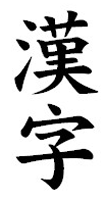 |
Kanji |
|
| |
Listed below are a
series of kanji that are used in Budoshin Ju-Jitsu, some of
which are applicable to other martial arts. I would like to
thank Brett Denisen, of the Mizukan Dojo, for providing me with
these kanji over the years. They are presented here with his
permission. |
| |
|
|
|
|
Terminology |
| |
|
|
|
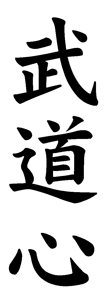 |
Budoshin: comprised of three characters: Bu =
martial, Do = way, Shin = Spirit
|
 |
Budoshin Ju-Jitsu: composed of the three
characters above plus Ju = gentle and Jitsu = art |
|
|
|
|
|
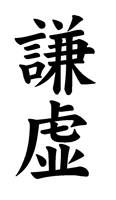 |
Humility: One of the three cornerstones of
the life-philosophy of Budoshin Ju-Jitsu.
Humility is your ability to be humble while maintaining your
integrity. You do not need to be boastful or tell people how
wonderful you are or how much you know or what you can do.
Although you may be quite knowledgeable or competent, it is for
others to discover through your behavior and your actions. It is
your ability to sincerely apologize when you have erred and help
others who are in need without expecting thanks or compensation.
Humility is based upon your sense of integrity and respect for
yourself and others.
|
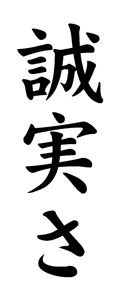 |
Integrity: One of the three cornerstones of the
life-philosophy of Budoshin Ju-Jitsu.
Integrity can be defined as your reputation; how you see
yourself and, more importantly, how other people see you. Are
you trustworthy? Are you reliable? Do you deal honestly with
yourself and others? Do you have a code of conduct [how you
treat yourself and others] that other people will respect you
for and seek to follow you and or your ideals or example? All of
these things combine to create your self-image and your sense of
integrity. They are based on your sense of respect and humility.
|
| |
|
|
|
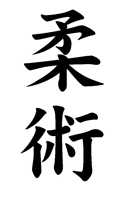 |
Ju-Jitsu: the "Gentle" Art
|
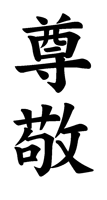 |
Respect: One of the three cornerstones of the
life-philosophy of Budoshin Ju-Jitsu.
Respect is your perception of yourself and how others perceive
you. It is how you treat others and they treat you. It is about
how you would like to be treated by other people. If others see
that you respect yourself [you have integrity and humility] then
they will respect you. Respect is never something you can
innately expect from others. It is something that must be earned
and maintained by maintaining your sense of integrity and
humility.
|
|
|
|
|
|
| Ranks and Honorary Titles |
| |
|
|
|
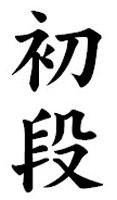 |
Shodan - 1st dan
|
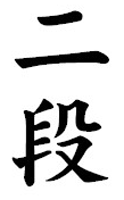 |
Nidan - 2nd dan |
|
|
|
|
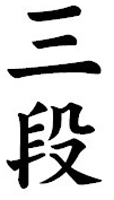 |
Sandan - 3rd dan
|
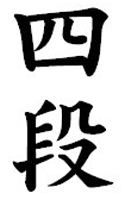 |
Yodan/Yondan - 4th dan |
|
|
|
|
|
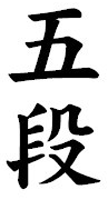 |
Godan - 5th dan
|
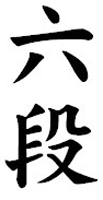 |
Rokudan - 6th dan |
|
|
|
|
|
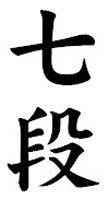 |
Shichidan - 7th dan
|
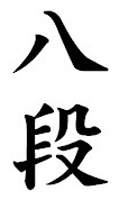 |
Hachidan - 8th dan |
|
|
|
|
|
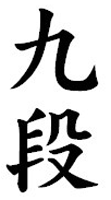 |
Kudan - 9th dan
|
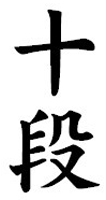 |
Judan - 10th dan |
|
|
|
|
|
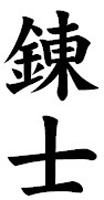 |
Renshi: A superior teacher. May be awarded after three years as
a godan [5th dan] or at any time as a rokudan [6th dan] or
higher.
|
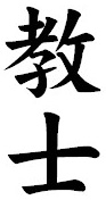 |
Kyoshi: A master teacher. May be awarded after three years as a
shichidan [7th] or at any time as a hachidan [8th dan] or
higher. |
|
|
|
|
|
 |
Shihan:
A person of high moral character, integrity, humility, and
scholarly abilities;
a model teacher.
May be awarded after three years as a hachidan
[8th] or at any time as a kudan [9th dan] or higher.
|
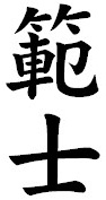 |
Hanshi:
A person of high moral character, integrity,
humility, and scholarly abilities in addition to being an
exceptional sensei. In addition, a person given this
honorary title is considered to be a model person who leads an
exemplary life and is seen as a teacher of teachers.
May be awarded at any time as a kudan [9th dan] or higher. |
| |
|
|
|
| Links to
Kanji [for the technically adept] and Japanese/English
Translations |
